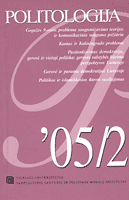Lietuvos prisitaikymas prie ES sanglaudos politikos: ES įtaka ir prisitaikymo rezultatai bei padariniai
Lithuania’s Adaption to the EU Cohesion Policy: The Influence of the EU and Outcomes of Adaption
Author(s): Vitalis NakrošisSubject(s): Politics / Political Sciences
Published by: Vilniaus universiteto leidykla & VU Tarptautinių santykių ir politikos mokslų institutas
Keywords: Lithuania's adaptation to the EU cohesion policy; Influence of the EU; EU enlargement; domestic institutional and public policy changes in Lithuania
Summary/Abstract: The main purpose of the article is to describe and explain Lithuania's adaptation to the EU cohesion policy. The analysis covers the period of 1996 (when the European Commission trigerred the process of adaptation by asking Lithuanian authorities to fill in the questionnaire) to 2002 (when Lithuania completed its membership negotiations with the EU). It is assumed in the adaptation literature that the mismatch between the EU and the national level determines the level of adaptation pressure. Since these concepts may not be very relevant in the candidate countries, where institutional and public policies are underdeveloped, the framework for analysing the adaptation process was adapted to the features of eastward enlargement of the EU (complexity, differentiation, conditionality and assymetry). For instance, the influence of the European Commission is emphasised in the framework for analysis. The main independent variable of this article is the influence of the EU during the accession period of 1996-2002, while the dependent variable is domestic institutional and public policy changes. The focus of the article extends beyond the description of main events in the process of Lithuania?s adaptation to the EU cohesion policy and covers outcomes (outputs, results and impact) of this process. The article assesses how the domestic institutional and public policy changes were influenced by the EU through various instruments (benchmarking and monitoring; provision of legislative and institutional templates; gate-keeping; aid and technical assistance; advice and twinning) and by domestic mediating factors (veto points; facilitating formal institutions; political and organisational culture; differential empowerment of actors; learning). Also, in order to explain the influence of domestic mediating factors, the atticle undertakes a detailed assessment of one critical decision (National Development Plan Concept Paper)...
Journal: Politologija
- Issue Year: 2003
- Issue No: 4 (32)
- Page Range: 18-68
- Page Count: 50
- Language: Lithuanian

